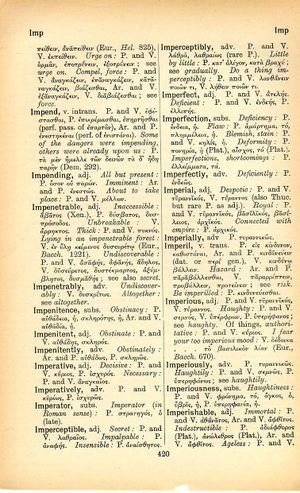imperative: Difference between revisions
From LSJ
ὁ δὲ μὴ δυνάμενος κοινωνεῖν ἢ μηδὲν δεόμενος δι' αὐτάρκειαν οὐθὲν μέρος πόλεως, ὥστε ἢ θηρίον ἢ θεός → a man who is incapable of entering into partnership, or who is so self-sufficing that he has no need to do so, is no part of a state, so that he must be either a lower animal or a god | whoever is incapable of associating, or has no need to because of self-sufficiency, is no part of a state; so he is either a beast or a god
(CSV4) |
(6_8) |
||
| Line 3: | Line 3: | ||
<b class="b2">Decisive</b>: P. and V. [[κύριος]], P. [[ἰσχυρός]]. | <b class="b2">Decisive</b>: P. and V. [[κύριος]], P. [[ἰσχυρός]]. | ||
<b class="b2">Necessary</b>: P. and V. [[ἀναγκαῖος]]. | <b class="b2">Necessary</b>: P. and V. [[ἀναγκαῖος]]. | ||
}} | |||
{{Lewis | |||
|lshtext=<b>impĕrātīvē</b>: (inp-), adv.,<br /><b>I</b><br /> v. the foll. [[art]]. | |||
}} | }} | ||

